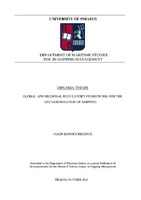| dc.contributor.advisor | Christodoulou, Anastasia | |
| dc.contributor.advisor | Χριστοδούλου, Αναστασία | |
| dc.contributor.author | Kontochristos, Jason | |
| dc.date.accessioned | 2024-11-08T06:39:42Z | |
| dc.date.available | 2024-11-08T06:39:42Z | |
| dc.date.issued | 2024-10 | |
| dc.identifier.uri | https://dione.lib.unipi.gr/xmlui/handle/unipi/17019 | |
| dc.identifier.uri | http://dx.doi.org/10.26267/unipi_dione/4441 | |
| dc.format.extent | 98 | el |
| dc.language.iso | en | el |
| dc.publisher | Πανεπιστήμιο Πειραιώς | el |
| dc.rights | Αναφορά Δημιουργού - Μη Εμπορική Χρήση - Παρόμοια Διανομή 3.0 Ελλάδα | * |
| dc.rights | Αναφορά Δημιουργού - Μη Εμπορική Χρήση - Παρόμοια Διανομή 3.0 Ελλάδα | * |
| dc.rights.uri | http://creativecommons.org/licenses/by-nc-sa/3.0/gr/ | * |
| dc.title | Global and regional regulatory framework for the decarbonisation of shipping | el |
| dc.type | Master Thesis | el |
| dc.contributor.department | Σχολή Ναυτιλίας και Βιομηχανίας. Τμήμα Ναυτιλιακών Σπουδών | el |
| dc.description.abstractEN | The maritime industry has developed into the most important mode of transportation for trading goods, since the vast majority of international commerce is delivered by sea. Due to its sheer size maritime industry is a significant contributor to the global production of GHG emissions. In order to tackle climate change and reduce shipping related emissions, IMO has developed a decarbonisation framework including a series of regulations, milestones and targets. Ship owners respond by adopting a multitude of technical and operational measures while also they examine alternative energy sources and propulsion methods their fleets. In order for most decarbonisation pathways to be successfully adopted a variety of barrier must be conquered. The installment of the available energy saving devices to new and existing ships and the replacement of the existing fleet with modern vessels with dual fuel engines, able to burn LNG or methane seems to be the most popular long term measures. Regarding immediate actions, slow steaming seems to be the most cost-efficient practice while the well timed scheduling of hull and propeller cleaning and the frequent machinery maintenance are considered key operational actions. In addition to IMO, regional regulators like the European Union have also developed their decarbonisation regulatory framework, applicable to the shipping industry as well. These regulations threaten to create a double speed of development between European and non-European marker shifting the interest of cargo owners towards neighboring markets and alternative modes of transport. Despite that, the majority of ship owners proceed to business as usual lettings charterers to deal with additional costs, alternative market routes and the selection of the most efficient vessels when calling ports under European jurisdiction. | el |
| dc.contributor.master | Ναυτιλιακή Διοικητική | el |
| dc.subject.keyword | IMO | el |
| dc.subject.keyword | EU ETS | el |
| dc.subject.keyword | Decarbonisation | el |
| dc.subject.keyword | CII | el |
| dc.subject.keyword | Response of the industry | el |
| dc.subject.keyword | Regulatory framework | el |
| dc.date.defense | 2024-10-03 | |



